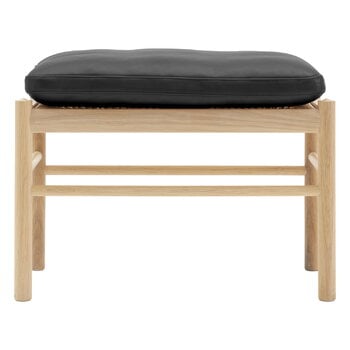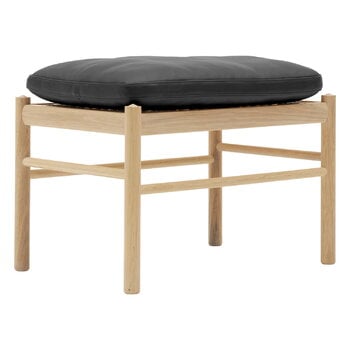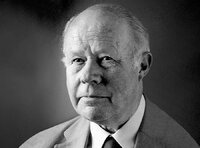Carl Hansen & Søn’s OW149F Colonial stool is a fine example of mid-century Scandinavian design and a perfect companion for the Colonial lounge chair, designed by the Danish designer Ole Wanscher in 1959. With its simple and timeless design, the footstool can also be used as an independent piece, for instance as an extra seat next to a sofa set. The slender, well-crafted solid wood frame and voluminous cushions create a sophisticated silhouette for the Colonial stool, which has been made by hand in Denmark.
OW149F Colonial footstool, oiled oak - black leather Thor 301
Carl Hansen & Søn
Description
Carl Hansen & Søn’s OW149F Colonial stool is a fine example of mid-century Scandinavian design and a perfect companion for the Colonial lounge chair, designed by the Danish designer Ole Wanscher in 1959. With its simple and timeless design, the footstool can also be used as an independent piece, for instance as an extra seat next to a sofa set. The slender, well-crafted solid wood frame and voluminous cushions create a sophisticated silhouette for the Colonial stool, which has been made by hand in Denmark.
Product details (6)
- Colour
- Oiled oak, black
- Width
- 60 cm
- Depth
- 40 cm
- Height
- 46 cm
- Frame material
- Oiled oak
- Upholstery fabric
- Thor 301 leather
- Product ID
Designer
Ole Wanscher (1903–1985) was a Danish furniture designer and one of the defining figures of the Danish modern style. Wanscher studied at the Royal Danish Academy of Fine Arts under the iconic designer Kaare Klint and later took over Klint’s professorship. Before becoming an independent designer, Wanscher worked at Klint’s design studio. Many of Wanscher’s designs were inspired by his travels in Europe and Egypt as well as his architectural and democratic approach to design. He aimed at creating functional, timeless and mostly industrially produced furniture for ordinary Danish homes.
View all productsReviews (0)
Sustainability
The Product Sustainability Framework, our criteria of sustainable design, helps you find the most sustainable products in our selection. Read below which sustainability criteria this product has met.
Working conditions & labour 8/9
-
Equal opportunities for all employees
-
Commitment to UN Global Compact, fair compensation for all employees
-
Corporate responsibility requirements defined and communicated for suppliers
-
Systematic work for improved inclusion and well-being in the workplace
-
Transparent supply chain
-
Suppliers' compliance to a code of conduct ensured
-
Compliance to the UN Guiding Principles on Business and Human Rights ensured in the supply chain
-
Support for community involvement in the supply chain
-
Direct suppliers audited and certified
Eco-friendly production 7/9
-
Fair and resource-wise water-use in production
-
No incineration or landfilling of returned items
-
No use of endangered species as materials
-
No direct environmental emissions or waste (excl. GHGs) from production
-
The sustainability of direct suppliers' production is addressed and monitored
-
Material-efficient and ecological packaging
-
No potentially harmful chemicals used in own production
-
Production and material sourcing that respect biodiversity, animal rights, and natural ecosystems
-
Positive impact on nature’s well-being through operations that regenerate natural ecosystems
Climate impact 6/8
-
Company's direct greenhouse gas emissions identified and commitment to reduction
-
Product's carbon impact identified and commitment to reduction
-
Guidance on energy- and eco-efficient use of the product
-
Contribution to climate initiatives beyond the brand’s direct operations
-
Low-carbon or compensated transportation
-
100 % renewable energy in own production and operations
-
Carbon footprint of the product calculated and goals set to reduce it
-
Carbon neutral or carbon negative product
Sustainable materials 6/6
-
Sustainable and long-lasting material choices
-
No harmful or hazardous substances
-
Responsible raw material sourcing and production
-
Materials suited for circularity: monomaterials, recyclable finishings, renewable or recycled contents etc.
-
Ecological materials: natural, biodegradable, recyclable or recycled contents
-
Outstanding materials in terms of innovativeness, responsibility, sustainability and circularity: local production or sourcing, 100 % recycled content, C2C-certification etc.
Circular design 5/5
-
High aesthetic quality promoting long-term use of the product
-
Technically durable product design and material choices
-
Design for enduring life-long quality
-
Design and support for product maintenance, repair and upgradability
-
Innovative circular design solutions: circular service system, resale platform, remanufacturing, collection of used products, etc.









